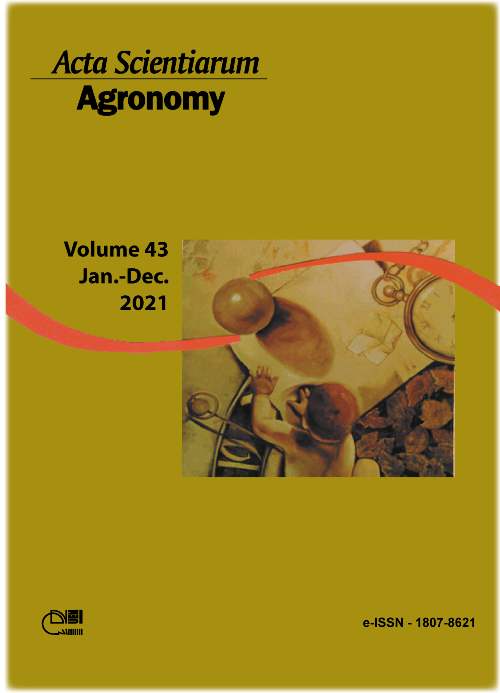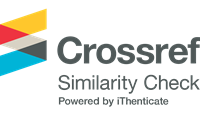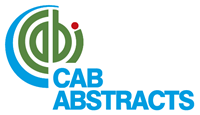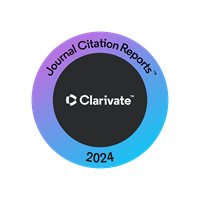Asian soybean rust control in response to rainfall simulation after fungicide application
Resumo
Asian soybean rust (Phakopsora pachyrhizi) is the main disease that affects soybean in Brazil. Fungicide applications are the main control method, but they can be influenced by the occurrence of rain. We aimed to study the control of Asian soybean rust in response to the occurrence of simulated rainfall at different times after fungicide application. The penetrant fungicides trifloxystrobin + prothioconazole (60 + 70 g a.i. ha-1) and azoxystrobin + benzovindiflupyr (60 + 30 g a.i. ha-1) and the nonpenetrant fungicides mancozeb (1,500 g a.i. ha-1), chlorothalonil (1,440 g a.i. ha-1), and copper oxychloride (672 g a.i. ha-1) were tested using two spray volumes: 70 and 150 L ha-1. Rain was simulated from 30 to 240 minutes after fungicide application. Soybean leaflets were collected and inoculated with a spore suspension of P. pachyrhizi (5.0 x 104 mL-1) and incubated in plastic boxes for 20 days. The trials were repeated twice. Nonpenetrant fungicides were more susceptible to rain washing, mainly when the 70 L ha-1 spray volume was used. For the penetrative fungicides, the best control percentages were obtained when the rainfall occurred between 120 and 180 minutes after application, while the protective fungicides had the best control percentages when the rainfall occurred approximately 240 minutes after application. The Asian rust control is affected by the characteristics of the fungicide applied, by the time interval between fungicide application and rain occurrence and by the spray volume.
Downloads
Referências
Abbott, W. S. (1925). A method of computing the effectiveness of on insecticide. Journal of Economic Entomology, 18(2), 265-267. DOI: 10.1093/jee/18.2.265a.
Chechi, A., Boller, W., Forcelini, C. A., Roehrig, R., & Zuchelli, E. (2018). Leaf area, spray volume and applicable quantities of fungicide during the protection period for control of Asian soybean rust. Summa Phytopathologica, 44(4), 326-331. DOI: 10.1590/0100-5405/174517
Cunha, J. P. A. R. da, Coelho, L., & Araújo, R. G. C. (2010). Spray nozzle and adjuvant effects on fungicidal control of soybean Asian rust. Interciência, 35(10), 765-768.
Cunha, J. P. A. R. da, Moura, E. A. C., Silva, J. L. J., Zago, F. A., & Juliatti, F. C. (2008). Efeito de pontas de pulverização no controle químico da ferrugem da soja. Engenharia Agrícola, 28(2), 283-291.
Cunha, J. P. A. R., Juliatti, F. C., & Reis, E. F. (2014). Tecnologia de aplicação de fungicida no controle da ferrugem-asiática da soja: resultados de oito anos de estudos em Minas Gerais e Goiás. Bioscience Journal, 30(4), 950-957.
Godoy, C. V., Seixas, C. D., Soares, R. M., Guimarães, F. C. M., Meyer, M. C., & Costamilan, L. M. (2016). Asian soybean rust in Brazil: past, present, and future. Pesquisa Agropecuária Brasileira, 51(5), 407-421. DOI: 10.1590/S0100-204X2016000500002
Godoy, C. V., Utiamada, C. M., Meyer, M. C., Campos, H. D., Lopes, I. O. N., Dias, A. R., ... Venancio, W. S. (2018). Eficiência de fungicidas para o controle da ferrugem-asiática da soja, Phakopsora pachyrhizi, na safra 2017/2018: Resultados sumarizados dos ensaios cooperativos. Londrina, PR: Embrapa Soja. Retrieved on May 10, 2018 from http://www.infoteca.cnptia.embrapa.br/ infoteca/ handle/doc/1094386
Hartman, G. L., Rupe, J. C. Sikora, E. J., Domier, L. L.; Davis, J. A.; & Steffey, K. L. (2015). Compendium of soybean diseases and pests. (5 ed.). St. Paul, US: American Phytopathological Society.
Hunshe, M., Damerow, L., Shmitz-Eiberger, M., & Noga, G. (2007). Mancozeb wash-off from apple seedlings by simulated rainfall as affected by drying time of fungicide deposit and rain characteristics. Crop Protection, 26(5), 768-774. DOI: 10.1016/j.cropro.2006.07.003
Inguagiato, J. C., & Miele, K. M. (2016). Influence of simulated rainfall on efficacy of fluazinam, chlorothalonil and iprodione for dollar spot control in creeping bentgrass. Crop Protection, 83(1), 48-55. DOI: 10.1016/j.cropro.2016.01.017
Klappach, K. (2017). Informação sobre carboxamidas em ferrugem da soja. Retrieved on May 10, 2018 from https://3f2c8573-584c-4b16-985f-14dc48f9ab81.filesusr.com/ugd/85b1d3_060a6876562140b693f03708057acff2.pdf
Klosowski, A. C; De Mio, L. L. M.; Miessner, S.; Rodrigues, R.; Stammler, G. (2016). Detection of the F129L mutation in the cytochrome b gene in Phakopsora pachyrhizi. Pest Manager Science, 72(6), 1211-1215. DOI: 10.1002/ps.4099
Lenz, G., Balardin, R. S., Minuzzi, S. P., Madalosso, M., Debortoli, M., Gulart, C., & Ramos, J. P. (2012). Espectros de gotas e idade de trifólios e sua interação com a área abaixo da curva de progresso da ferrugem da soja. Ciência Rural, 42(1), 1528-1534. DOI: 10.1590/S0103-84782012005000066
Levy, C. (2015). Epidemiology and chemical control of soybean rust in southern Africa. Plant Disease, 89(1), 669-674. DOI: 10.1094/PD-89-0669
Ministério da Agricultura, Pecuária e Abastecimento [MAPA]. (2018). Sistema de Agrotóxicos Fitossanitários (Agrofit). Retrieved on May 10, 2018 from http://agrofit.agricultura.gov.br/agrofit_cons/principal_agrofit_cons
of alternaria brown spot of citrus. Plant Disease, 91(4), 393-399. DOI: 10.1094/PDIS-91-4-0393
Perez-Rodriguez, P., Soto-Gomez, D., Lopez-Periago, J. E., & Paradelo, M. (2015). Modeling raindrop strike performance on cooper wash-off from vine leaves. Journal of Environmental Management, 150(1), 472-478. DOI: 10.1016/j.jenvman.2014.12.036
Pigati, R. L., Dernoeden, P. H., & Grybauskas, A. P. (2010). Simulated rainfall and mowing impact fungicide performance when targeting dollar spot in creeping bentgrass. Plant Disease, 94(5), 596-603. DOI: 10.1094 / PDIS-94-5-0596
Prado, E. P., Raetano, C. G., Dal Pogetto, M. H. F. A., Saulo, I. A., Costa, S. I. A., & Christovam, R. S. (2015). Taxa de aplicação e uso de surfactante siliconado na deposição da pulverização e controle da ferrugem da soja. Engenharia Agrícola, 35(3), 514-527. DOI: 10.1590/ 809-4430-Eng.Agric.v35n3p 514-527/ 2015
Rani, R., Sharma, V. K., Kumar, P., & Mohan, C. (2015). Impact of simulated rainfall on pesticide of fungicides used against late blight (Phytopththora infestans) on tomato (Solanum lycopersicum). Indian Journal of Agriculture Sciences, 85(2), 256-260.
Reis, E. M. (2014). Critério: preventivo. In E. M. Reis (Ed.), Indicadores do momento para a aplicação de fungicidas visando ao controle de doenças nas culturas da soja e do trigo (p. 67-76). Passo Fundo, RS: Berthier.
Reunião de Pesquisa de Soja da Região Sul. (2012). Indicações técnicas para a cultura da soja no Rio Grande do Sul e em Santa Catarina, safras 2012/2013 e 2013/2014. Passo Fundo, RS: Embrapa Trigo.
Roehrig, R., Boller, W., Forcelini, C. A., & Chechi, A. (2018). Use of surfactant with diferente volumes of fungicide applications in soybean culture. Engenharia Agrícola, 38(4), 577-589. DOI: 10.1590/1809-4430-eng.agric.v38n4p577-589/2018
Rossouw, C. J., Fourie, P. H., Van Zyl, G. G., Hoffman, J. E., & McLéod, A. (2018). Rainfastness of mancozeb on apple seedling determinated through deposintion quantification of mancozeb residue and a flourescent pigment. Crop protection, 106(1), 93-102. DOI: 10.1016/j.cropro.2017.12.008
Scherb, C. T., & Mehl, A. (2006). Detached leaf test method. Retrieved on May 10, 2018 from http://www.frac.info/docs/default-source/monitoring-methods/approvedmethods/phakpa-detached-leaf-monitoring-method-bcs-2006 v1.pdf?sfvrsn=4e9a419a_4
Sierotzki, H., & Scalliet, G. (2013). A review of current knowledge of resistance aspects for the next-generation succinate dehydrogenase inhibitor fungicides. Phytopathology, 103(9), 880-887. DOI: 10.1094/PHYTO-01-13-0009-RVW
Stefanello, M. T., Balardin, R. S., Minuzzi, S. G., Dalla Favera, D. L., Marques, L. N., Pezzini, D. T., & Ebone, A. (2016). Effect of the interaction between fungicide application time and rainfall simulation interval on Asian Soybean Rust control effectiveness. Semina: Ciências Agrárias, 37(6), 3881-2892. DOI: 10.5433/1679-0359.2016v37n6p3881
Tofoli, J. G., Domingues, R. J., Melo, P. C. T., & Ferrari, J. T. (2014). Efeito de chuva simulada sobre a eficiência de fungicidas no controle de requeima e pinta preta de batata. Semina: Ciências Agrárias, 35(6), 2977-2990. DOI: 10.5433/1679-0359.2014v35n6p2977
Vincent, A., Armengol, J., & García-Jiménez, J. (2007). Rainfastness and persistence of fungicides for control of alternaria brown spot of citrus. Plant Disease, 91(4), 393-399. DOI: 10.1094 / PDIS-91-4-0393
DECLARAÇÃO DE ORIGINALIDADE E DIREITOS AUTORAIS
Declaro que o presente artigo é original, não tendo sido submetido à publicação em qualquer outro periódico nacional ou internacional, quer seja em parte ou em sua totalidade.
Os direitos autorais pertencem exclusivamente aos autores. Os direitos de licenciamento utilizados pelo periódico é a licença Creative Commons Attribution 4.0 (CC BY 4.0): são permitidos o compartilhamento (cópia e distribuição do material em qualqer meio ou formato) e adaptação (remix, transformação e criação de material a partir do conteúdo assim licenciado para quaisquer fins, inclusive comerciais.
Recomenda-se a leitura desse link para maiores informações sobre o tema: fornecimento de créditos e referências de forma correta, entre outros detalhes cruciais para uso adequado do material licenciado.





















































